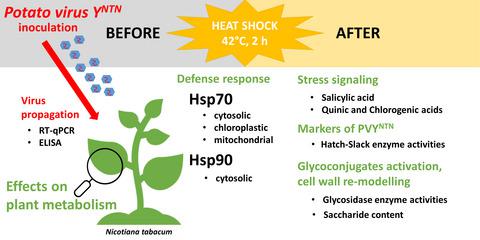当前位置:
X-MOL 学术
›
Plant Biol.
›
论文详情
Our official English website, www.x-mol.net, welcomes your
feedback! (Note: you will need to create a separate account there.)
Effects of heat treatment on metabolism of tobacco plants infected with Potato virus Y
Plant Biology ( IF 4.2 ) Pub Date : 2021-01-08 , DOI: 10.1111/plb.13234 V Hýsková 1 , K Bělonožníková 1 , V Doričová 1 , D Kavan 1 , S Gillarová 2 , S Henke 2 , H Synková 3 , H Ryšlavá 1 , N Čeřovská 3
中文翻译:

热处理对感染马铃薯Y病毒的烟草植株代谢的影响
更新日期:2021-02-04
Plant Biology ( IF 4.2 ) Pub Date : 2021-01-08 , DOI: 10.1111/plb.13234 V Hýsková 1 , K Bělonožníková 1 , V Doričová 1 , D Kavan 1 , S Gillarová 2 , S Henke 2 , H Synková 3 , H Ryšlavá 1 , N Čeřovská 3
Affiliation

|
- Many factors affect successful virus propagation and plant defence responses. Heat shock protein (Hsp) expression after heat shock plays an ambiguous role in viral infection. On the one hand, Hsp70 participates in plant defence response; on the other hand, Hsp70 could interact with viral proteins and facilitate virus propagation.
- Here, we studied metabolic adaptations of Nicotiana tabacum L. subjected to heat shock (42 °C, 2 h) before or after inoculating the plants with Potato virus Y (potyvirus). RT‐qPCR and ELISA were used for potyvirus quantification. Hsp70 and Hsp90 isoforms were analysed by Western blotting. Salicylic, quinic and chlorogenic acid content was determined by LC‐MS. The activity of Hatch–Slack enzymes (as markers of potyviral infection in tobacco) and glycosidases was assayed.
- Application of heat shock before or after inoculation showed accelerated potyviral propagation in comparison with only inoculated plants. Plants exposed to heat shock and concurrently inoculated showed higher potyviral content, higher amount of Hsp70, together with late decline of quinic acid content and low chlorogenic acid content. Spread of potyviral infection correlated with enhanced salicylic acid content and activities of enzymes of the Hatch–Slack cycle, α‐ and β‐galactosidase, α‐mannosidase, α‐glucosidase and β‐N‐acetylhexosaminidase.
- Heat shock proteins accelerate potyviral propagation. The lower weight cytosolic and mitochondrial Hsp70 (~50‐75 kDa) persist throughout the viral infection. Also, the plant defense response results in increase of salicylic and chlorogenic acids but decrease of quinic acid content.
中文翻译:

热处理对感染马铃薯Y病毒的烟草植株代谢的影响
许多因素影响病毒的成功传播和植物防御反应。热休克后的热休克蛋白(Hsp)表达在病毒感染中发挥着模糊的作用。一方面,Hsp70参与植物防御反应;另一方面,Hsp70可以与病毒蛋白相互作用并促进病毒传播。
在这里,我们研究了在用马铃薯病毒 Y (马铃薯病毒)接种植物之前或之后经受热激(42°C,2 小时)的烟草的代谢适应。 RT-qPCR 和 ELISA 用于马铃薯病毒定量。通过蛋白质印迹分析 Hsp70 和 Hsp90 亚型。通过LC-MS测定水杨酸、奎尼酸和绿原酸含量。测定了 Hatch-Slack 酶(作为烟草马铃薯病毒感染的标记物)和糖苷酶的活性。
与仅接种的植物相比,接种之前或之后施加热激显示马铃薯病毒传播加速。经受热休克并同时接种的植物表现出较高的马铃薯病毒含量、较高的Hsp70含量、以及奎尼酸含量较晚的下降和较低的绿原酸含量。马铃薯病毒感染的传播与水杨酸含量和 Hatch-Slack 循环酶、α-和 β-半乳糖苷酶、α-甘露糖苷酶、α-葡萄糖苷酶和 β-N-乙酰己糖胺酶活性的增强相关。
热休克蛋白加速马铃薯病毒的繁殖。较低重量的胞浆和线粒体 Hsp70 (~50-75 kDa) 在整个病毒感染过程中持续存在。此外,植物防御反应导致水杨酸和绿原酸含量增加,但奎宁酸含量减少。











































 京公网安备 11010802027423号
京公网安备 11010802027423号